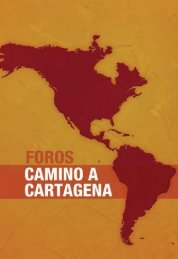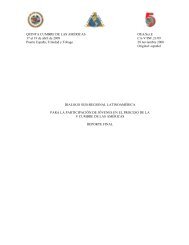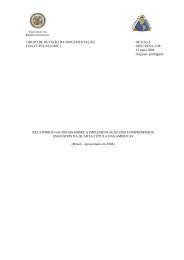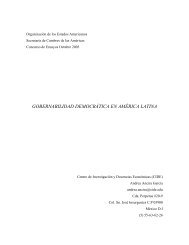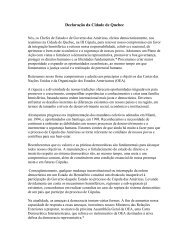The Road to Hemispheric Cooperation: Beyond the Cartagena
The Road to Hemispheric Cooperation: Beyond the Cartagena
The Road to Hemispheric Cooperation: Beyond the Cartagena
Create successful ePaper yourself
Turn your PDF publications into a flip-book with our unique Google optimized e-Paper software.
5. Respect and Apply <strong>the</strong> IADC Regarding Cuba<br />
Finally, member states and <strong>the</strong> secretary general<br />
should indeed respect and apply fully <strong>the</strong> IADC (as<br />
well as <strong>the</strong> 2001 and 2009 summits’ commitments <strong>to</strong><br />
democracy and human rights, and <strong>the</strong> 2009 Honduras<br />
General Assembly Resolution on Cuba), <strong>to</strong> prevent<br />
<strong>the</strong> present government of Cuba from participating in<br />
<strong>the</strong> activities of <strong>the</strong> organization and in <strong>the</strong> presidential<br />
summits—unless <strong>the</strong> Cuban authorities are willing<br />
<strong>to</strong> comply with <strong>the</strong> provisions of <strong>the</strong> Charter. In o<strong>the</strong>r<br />
words, Cuba should be welcome <strong>to</strong> attend <strong>the</strong> inter-<br />
American ga<strong>the</strong>rings, but only as a democratic state.<br />
<strong>The</strong> fact that <strong>the</strong> exercise of democracy and protection<br />
of human rights are a precondition for participation in<br />
<strong>the</strong> inter-American system is in no small way <strong>the</strong> result<br />
of Latin American countries’ proposals and his<strong>to</strong>rical<br />
aspirations for a democratic hemisphere—as many of<br />
<strong>the</strong>m had suffered through long, harsh dicta<strong>to</strong>rships in<br />
<strong>the</strong> 1970s and 1980s. Democracy and human rights<br />
are not impositions from <strong>the</strong> United States. <strong>The</strong>ir predominance<br />
<strong>to</strong>day as supreme political values of <strong>the</strong><br />
inter-American system is a Latin American as much<br />
as a hemispheric achievement, one that must not be<br />
relinquished because of anachronistic (and currently<br />
unwarranted) anti-U.S. prejudices. If <strong>the</strong> IADC is ignored<br />
in <strong>the</strong> case of Cuba, it would be irremediably<br />
devalued and consigned <strong>to</strong> irrelevance. 17<br />
<strong>The</strong> Challenge of Reforming <strong>the</strong> Charter<br />
If applying <strong>the</strong> IADC <strong>to</strong> <strong>the</strong> fullest is a daunting challenge for<br />
<strong>the</strong> secretary general and <strong>the</strong> member states, an even more<br />
challenging and complicated task is <strong>to</strong> reform it. Never<strong>the</strong>less,<br />
<strong>the</strong>re are a few reforms that appear necessary <strong>to</strong> make<br />
<strong>the</strong> Charter a stronger, more effective instrument, particularly<br />
in terms of <strong>the</strong>ir impact on its preventive functions.<br />
1. Clarify <strong>the</strong> Meaning of an “Unconstitutional<br />
Interruption”<br />
One reform would be <strong>to</strong> clarify and define what exactly<br />
member states consider “an unconstitutional alteration”<br />
of <strong>the</strong> democratic order <strong>to</strong> be, as differentiated from an<br />
“unconstitutional interruption” by a coup, for example.<br />
This would facilitate <strong>the</strong> secretary general or member<br />
states’ ability <strong>to</strong> call attention <strong>to</strong> events that fit <strong>the</strong> definition.<br />
Just as important, it would make it easier for<br />
<strong>the</strong>m, based on Article 20, <strong>to</strong> convoke <strong>the</strong> Permanent<br />
Council for a collective assessment of <strong>the</strong> situation.<br />
This in turn may serve as <strong>the</strong> basis for early preventive<br />
actions against <strong>the</strong> actual interruption of democratic<br />
governance.<br />
Up <strong>to</strong> now, <strong>the</strong> secretary general and member states<br />
have not been able <strong>to</strong> agree on a definition of an “unconstitutional<br />
alteration.” Thus, <strong>the</strong>y have been reluctant<br />
<strong>to</strong> condemn or even <strong>to</strong> call attention <strong>to</strong> a regime which,<br />
despite having emerged from democratic elections, never<strong>the</strong>less<br />
shows clear signs of increasing authoritarianism<br />
and in<strong>to</strong>lerance, not <strong>to</strong> mention violating democratic<br />
institutions, values and practices enshrined in <strong>the</strong> Charter.<br />
Such alteration by erosion is by nature more ambiguous<br />
and does not provoke au<strong>to</strong>matic agreement or collective<br />
condemnation by <strong>the</strong> member states. For some,<br />
it constitutes a process that uses democratic means <strong>to</strong><br />
establish an authoritarian regime, which violates democratic<br />
institutions, values and practices. For o<strong>the</strong>rs (such<br />
as those who support governments that make those “alterations”),<br />
it is a process that represents democratic,<br />
constitutional and legitimate political changes in favor of<br />
a previously excluded majority.<br />
2. Allow O<strong>the</strong>r Branches of Government <strong>to</strong> Speak <strong>to</strong><br />
<strong>the</strong> Permanent Council<br />
Ano<strong>the</strong>r reform <strong>to</strong> consider is <strong>to</strong> allow <strong>the</strong> possibility<br />
that o<strong>the</strong>r branches of government (e.g., <strong>the</strong> legislature<br />
or <strong>the</strong> judiciary) be permitted <strong>to</strong> express before <strong>the</strong> Permanent<br />
Council <strong>the</strong>ir views on violations of <strong>the</strong> Charter<br />
and threats <strong>to</strong> <strong>the</strong> democratic order in <strong>the</strong>ir respective<br />
countries.<br />
<strong>The</strong> IADC does not permit <strong>the</strong> legislative or <strong>the</strong> judicial<br />
branches <strong>to</strong> ask <strong>the</strong> Permanent Council <strong>to</strong> convoke a<br />
meeting <strong>to</strong> discuss, for example, threats <strong>to</strong> <strong>the</strong>ir independence<br />
or <strong>the</strong>ir very existence. In <strong>the</strong>ory, in an international<br />
organization such as <strong>the</strong> OAS, presidential democracies—which<br />
supposedly embrace <strong>the</strong> principles of<br />
independence and separation of powers—should allow<br />
o<strong>the</strong>r branches of government <strong>the</strong> opportunity <strong>to</strong> bring<br />
attention <strong>to</strong> alleged breaches of democratic order.<br />
In contemporary practice of international relations, <strong>the</strong><br />
executive branch, through its ministry of foreign affairs,<br />
<strong>The</strong> <strong>Road</strong> <strong>to</strong> <strong>Hemispheric</strong> <strong>Cooperation</strong>: <strong>Beyond</strong> <strong>the</strong> <strong>Cartagena</strong> Summit of <strong>the</strong> Americas<br />
<strong>The</strong> Brookings Institution ❘ Latin America Initiative<br />
83



